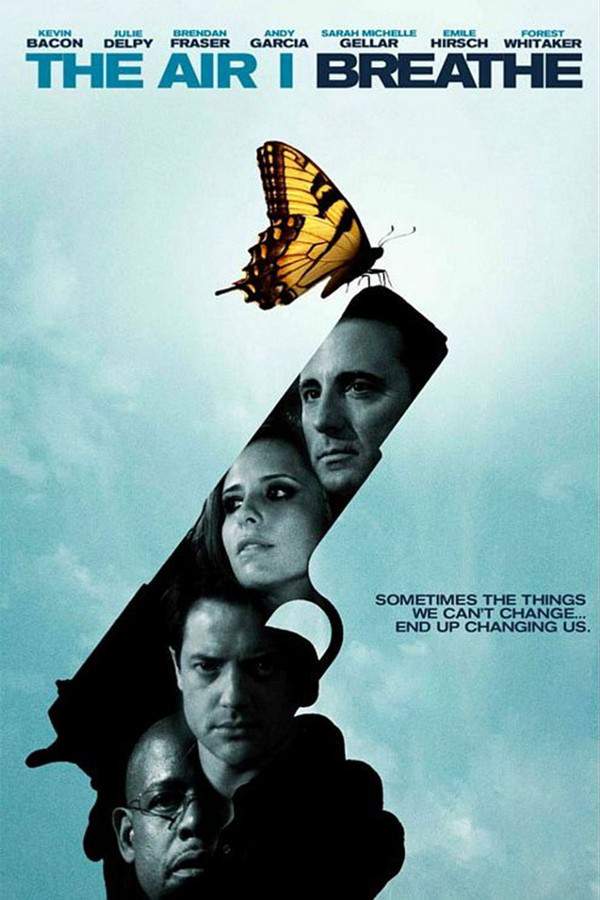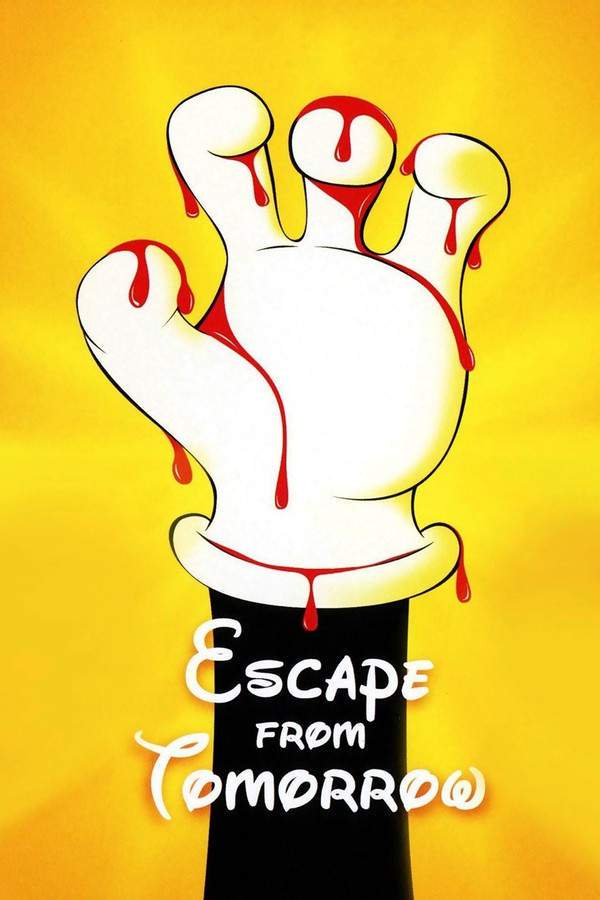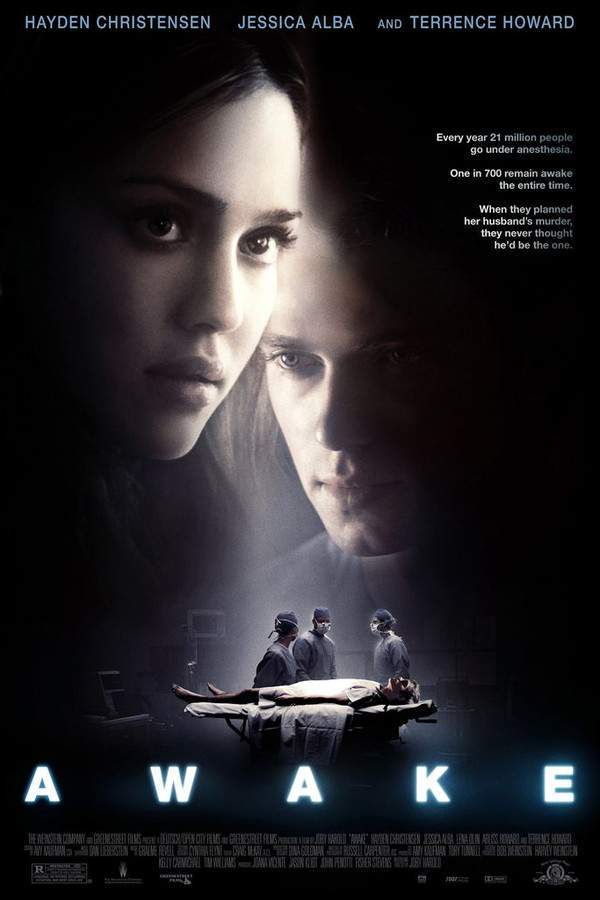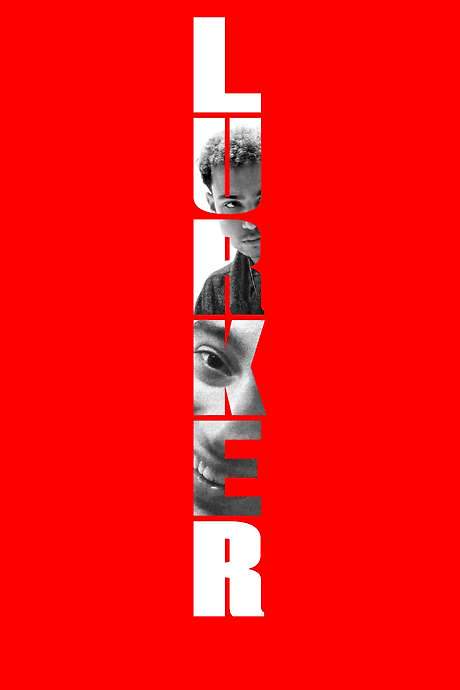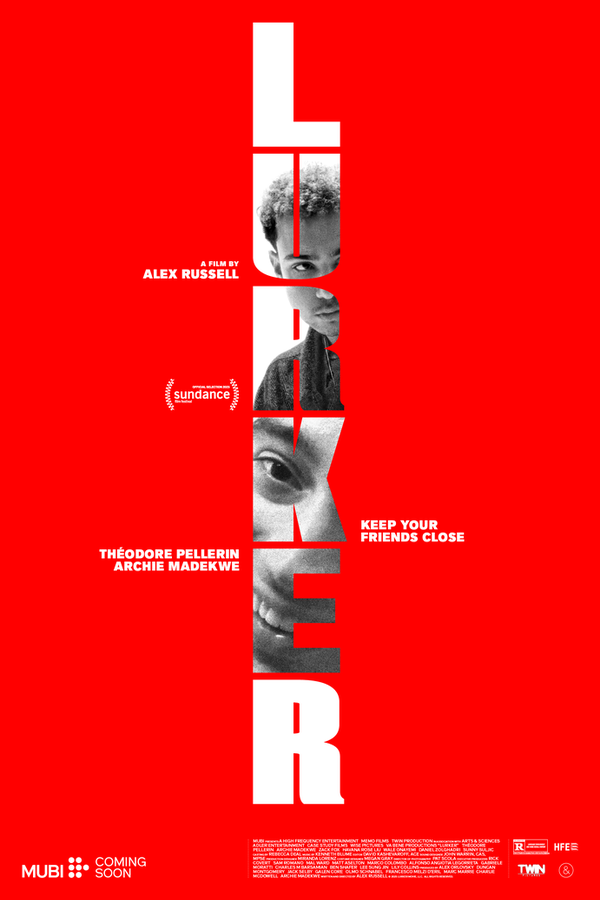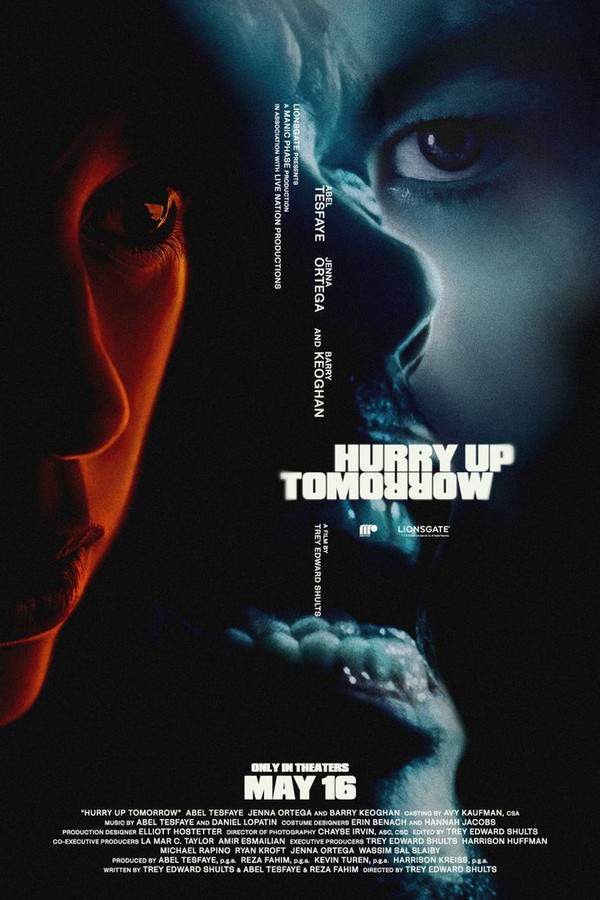
Hurry Up Tomorrow 2025
Directed by

Trey Edward Shults
Made by

Live Nation Productions
Test your knowledge of Hurry Up Tomorrow with our quiz!
Hurry Up Tomorrow Plot Summary
Read the complete plot summary and ending explained for Hurry Up Tomorrow (2025). From turning points to emotional moments, uncover what really happened and why it matters.
The film opens with a young woman’s voice, Riley Keough, leaving a voicemail for her ex-lover, expressing her hurt and disappointment, and indicating that she is moving on from the relationship.
Meanwhile, in Los Angeles, another young woman named Anima is seen engulfing her home in gasoline before igniting a blaze and fleeing the scene, desperate to evade being discovered. Anima ignores numerous messages from her mother as she makes her way to a concert, hiding from her past.
At the same time, music superstar Abel Tesfaye, known as The Weeknd, is preparing for a show, going through vocal warm-ups. He is visited by his manager Lee, who attempts to boost his confidence. Once on stage, Abel electrifies thousands of fans with his performance. Post-show, he indulges in a wild party with Lee and various groupies, all while being haunted by feelings of loss for his ex-girlfriend, the woman from the voicemail, which leads him into a spiral of sadness and depression.
As he gears up for a Halloween concert, Abel receives distressing news about being diagnosed with muscle tension dysphonia. This revelation, compounded by his regret for his ex, tempts him to cancel his performance. However, Lee manages to persuade him to go on, encouraging him to push through for both his fans and himself. The tension mounts when Anima appears in the crowd during the show. Just as Abel steps into his first song, his voice falters, and he abruptly walks offstage, unleashing a tirade of anger in a voicemail directed at his ex, as he feels their separation intensely.
Afterward, Anima finds Abel backstage and, despite the presence of security, they connect and end up sharing the night together, exploring the city, culminating in a trip to the Santa Monica Pier. In a moment of intimacy at his hotel, Abel plays a snippet of his latest track, “Wake Me Up.” It resonates deeply with Anima, who feels the song encapsulates her own experiences of loneliness and abandonment.
Abel’s night takes a turn as he experiences a vivid nightmare that confronts his childhood self amidst surreal visions. The following morning, as he prepares to return to his busy life of performances, he overhears Anima arguing with her mother about the recent fire she set. Just as Abel is ready to leave, Anima’s emotions erupt, and she tries to push him to be vulnerable with her. When he dismisses her, claiming she is merely a fan, she retaliates by striking him with a champagne bottle.
Abel wakes up, confused and restrained to the hotel bed. Anima begins to play his tracks, including “Blinding Lights” and “Gasoline,” hoping that their shared themes might coax him into revealing his feelings. However, Abel remains silent, believing he has nothing of significance to say. Their situation escalates when Lee, intoxicated, knocks on the door. Anima’s attempts to push him away devolve into a violent confrontation. In a desperate moment, she stabs Lee in the neck, leaving him to perish. Then, with a breakdown of her own, Anima attempts to douse Abel with gasoline, since he remains unresponsive. However, as Abel starts to sing a prolonged version of “Wake Me Up,” touching her inner turmoil, she allows him to go free and sets the room alight.
Emerging from the chaos, Abel walks to his next performance, evidently shaken. He finds himself in the green room, staring back at his reflection, grappling with the shadows of his experience and the trauma that now looms over him.
In this narrative, Abel Tesfaye/The Weeknd portrays a fictionalized version of himself as he navigates a tumultuous landscape of emotional strife regarding a lost relationship and the pressures of his musical career. His encounter with Anima, a fervent fan who intertwines her life with his, results in a dark and thrilling adventure that leads her to an extreme act when he cannot open up. Ultimately, after losing Lee to violent circumstances and facing the inferno of their shared experiences, Abel is propelled back into the spotlight, forever altered by the night’s events.
Hurry Up Tomorrow Timeline
Follow the complete movie timeline of Hurry Up Tomorrow (2025) with every major event in chronological order. Great for understanding complex plots and story progression.
Riley's Message
The film begins with a message from Riley, a young woman, leaving a voicemail for her former lover. She expresses her hurt and disappointment, making it clear that she is choosing to leave him behind.
Anima's Desperation
In a moment of turmoil, Anima douses her home in gasoline and sets it ablaze before fleeing the scene. She is seen attempting to evade her mother's attempts to reach her, showcasing her inner chaos as she heads towards a concert.
Abel's Performance
Music superstar Abel Tesfaye, also known as The Weeknd, is preparing for a major concert. Despite his excitement, he is haunted by the memories of his ex-girlfriend, which casts a shadow over his success.
Night of Excess
After a successful performance, Abel finds himself indulging in a wild party with his manager Lee and various groupies. However, his feelings of emptiness and longing for his ex-girlfriend start to overshadow the fleeting pleasures of the night.
Diagnosis and Doubts
Before his Halloween concert, Abel is diagnosed with muscle tension dysphonia, complicating his emotional state. The combination of physical and emotional distress leads him to contemplate canceling his show, reflecting his inner struggles.
The Concert's Breakdown
Despite his doubts, Abel ultimately takes the stage for his performance, with Anima watching from the crowd. His vulnerability becomes apparent when his voice cracks mid-song, prompting him to abruptly leave the stage and express his frustration in a foul-mouthed voicemail to his ex.
Unexpected Connection
After leaving the stage, Abel encounters Anima backstage, who has managed to evade security. They share an emotionally charged night exploring the city and forming a deeper bond over the themes of Abel's latest music.
Nightmare and Reflection
Abel experiences a vivid nightmare where he faces his childhood self, illustrating the various layers of his trauma. This surreal vision highlights the inner conflict he grapples with as he navigates fame and personal pain.
Confrontation with Anima
As dawn breaks, Abel overhears Anima arguing with her mother about her arson. Their conversation escalates when Anima confronts him aggressively; she feels abandoned and attempts to compel him to share his feelings.
Captivity and Music
Suddenly, Abel wakes up tied to the bed in his hotel room, with Anima playing his songs. She dances while discussing the themes of their toxic relationship, hoping to connect with him, but he remains emotionally distant.
Violence and Chaos
Lee, Abel's manager, arrives drunk and a violent struggle ensues with Anima. In a moment of desperation, she stabs Lee in the neck, leaving him bleeding as she runs back to Abel, escalating the situation further.
Desperate Measures
After the violent confrontation, Anima attempts to drown Abel in gasoline, feeling betrayed by his silence. However, Abel's heartfelt rendition of 'Wake Me Up' resonates with her, leading her to spare him at the last moment.
Fire and Freedom
Anima allows Abel to leave but then sets the hotel room on fire as she lets go of her frustrations. Abel walks out traumatized but now free from his captivity, heading back towards his music career.
Return to Performance
Abel strides back towards the stage for his next performance, haunted yet determined. He emotionally stares at his reflection, confronting the tumultuous events he has just endured.
Hurry Up Tomorrow Characters
Explore all characters from Hurry Up Tomorrow (2025). Get detailed profiles with their roles, arcs, and key relationships explained.
Lee (Barry Keoghan)
Lee acts as Abel's manager and friend, trying to guide him through the emotional turmoil while struggling with his own issues. His efforts to encourage Abel to perform reflect his concern but also his own desperation for maintaining success. Lee's fate serves as a pivotal moment in the film about the consequences of unchecked emotions.
Anima (Jenna Ortega)
Anima is a fan who struggles with her own sense of loneliness and abandonment, leading her to actions that spiral out of control. Her character embodies both vulnerability and aggression, illustrating the complex interplay of desire and despair. Anima's fixation on Abel highlights the detrimental effects of emotional instability.
Abel Tesfaye/The Weeknd
Playing a fictionalized version of himself, Abel embodies the struggles of fame marked by emotional isolation and health challenges. His character's journey through heartbreak and performance reflects the highs and lows of being a public figure. The internal conflict he faces serves as the crux of the film, emphasizing the multifaceted nature of identity.
Hurry Up Tomorrow Settings
Learn where and when Hurry Up Tomorrow (2025) takes place. Explore the film’s settings, era, and how they shape the narrative.
Time period
Contemporary
The movie takes place in contemporary times, reflecting the current music and cultural scene. It addresses modern issues such as mental health, the pressures of fame, and the complexity of relationships. This time period emphasizes the struggles of individuals in the entertainment industry, particularly how they cope with emotional turmoil.
Location
Los Angeles, Santa Monica Pier
Los Angeles is known as the entertainment capital of the world, filled with iconic sites and a vibrant culture. The Santa Monica Pier is a popular coastal destination, famous for its amusement park, restaurants, and ocean views. The pier often serves as a backdrop for creativity and expression, making it an apt location for the film's exploration of music and personal conflict.
Hurry Up Tomorrow Themes
Discover the main themes in Hurry Up Tomorrow (2025). Analyze the deeper meanings, emotional layers, and social commentary behind the film.
💔
Heartbreak
The film dives deep into the theme of heartbreak as both Abel and Anima grapple with their past relationships. Abel's struggles with missing his ex-girlfriend drive his emotional state, while Anima's actions reflect her own unresolved feelings. The narrative showcases how heartbreak can lead to desperation and drastic actions.
🔥
Desperation
Desperation permeates the film as characters make impulsive decisions in moments of emotional pain. Anima's extreme actions, including setting her house on fire and later threatening Abel, highlight how desperation can manifest in toxic behavior. This theme serves as a cautionary tale about the lengths individuals may go to for emotional connection.
🎤
Identity
Identity is a central theme as Abel navigates life as a superstar while dealing with deep-seated personal issues. His struggle with self-expression and vulnerability, especially during performances, emphasizes the conflict between public persona and private pain. The film encourages reflection on how identity can be shaped by trauma and artistic expression.

Coming soon on iOS and Android
The Plot Explained Mobile App
From blockbusters to hidden gems — dive into movie stories anytime, anywhere. Save your favorites, discover plots faster, and never miss a twist again.
Sign up to be the first to know when we launch. Your email stays private — always.
Hurry Up Tomorrow Ending Explained
Unravel the ending of Hurry Up Tomorrow (2025) with our detailed explanation. Understand the final scenes, character fates, and unresolved questions.
In the climax of Hurry Up Tomorrow, Abel, played by Tesfaye, finds himself on a windswept rooftop, symbolizing a threshold between his old self and something new. There, he encounters Anima, a haunting figure played by Jenna Ortega, who has been guiding him through his psychological nightmare. As their interaction reaches its peak, Anima douses Abel in gasoline and sets him on fire. Striking the match, she essentially ignites a moment of catharsis. Abel is engulfed in flames but doesn’t perish; instead, he stands there, unburned, his face blank but illuminated by the blaze. This powerful image signifies a symbolic death and rebirth—shedding his former identity as The Weeknd and emerging anew. The flames are a metaphor for transformation, pain, and renewal, suggesting that Abel has confronted his inner demons and is ready to move forward without his past persona. The film ends with him walking alone into the morning light, silent and unmarked, embodying a sense of quiet rebirth and an uncertain, yet hopeful, future. The ending leaves viewers with the impression that he has ultimately embraced his true self beyond the fame and facade, closing the chapter on his persona and beginning a new personal journey.
Hurry Up Tomorrow Spoiler-Free Summary
Discover the spoiler-free summary of Hurry Up Tomorrow (2025). Get a concise overview without any spoilers.
In the neon‑lit sprawl of Los Angeles, a celebrated music star battles an unrelenting insomnia that blurs the line between waking and dreaming. Abel Tesfaye drifts through rehearsals, backstage corridors, and solitary hotel rooms, his talent a bright yet fragile beacon in a world that feels increasingly unmoored. The city’s relentless pulse mirrors his own restless mind, turning ordinary moments into disorienting reveries that hint at something deeper than mere fatigue.
Within this heightened atmosphere appears Anima, a mysterious presence whose obsession with Abel’s art is matched only by the secrets she keeps hidden behind her quiet exterior. She moves through the same nocturnal streets, her own past a flickering ember that refuses to be fully extinguished. Guiding Abel’s career is his pragmatic manager, Lee, whose steady encouragement serves as both a lifeline and a reminder of the expectations that weigh on the performer. Together, they inhabit a scene where concerts become cathartic rituals and every backstage whisper feels charged with unspoken tension.
As Abel’s performances swell and his voice trembles on the edge of collapse, the invisible thread linking him to Anima grows taut. Their encounters—whether in a crowded arena, a darkened hallway, or the endless expanse of a pier lit by moonlight—are tinged with a surreal quality that forces both to confront the fragility of identity. The film’s tone skitters between electric euphoria and hushed dread, inviting the audience to question what is real when fame, fear, and longing collide.
The story moves like a sleepless dream, its mood drenched in atmospheric soundscapes and flickering lights, leaving viewers perched on the cusp of revelation. In a world where music can both heal and haunt, Abel and Anima stand on the brink of an encounter that may reshape how they understand themselves and each other.
Can’t find your movie? Request a summary here.
Movies with Similar Twists and Themes
Uncover films that echo the narrative beats, emotional arcs, or dramatic twists of the one you're exploring. These recommendations are handpicked based on story depth, thematic resonance, and spoiler-worthy moments — perfect for fans who crave more of the same intrigue.
Featured on this page

What's After the Movie?
Not sure whether to stay after the credits? Find out!
Explore Our Movie Platform
New Movie Releases (2026)
Famous Movie Actors
Top Film Production Studios
Movie Plot Summaries & Endings
Major Movie Awards & Winners
Best Concert Films & Music Documentaries
Movie Collections and Curated Lists
© 2026 What's After the Movie. All rights reserved.




